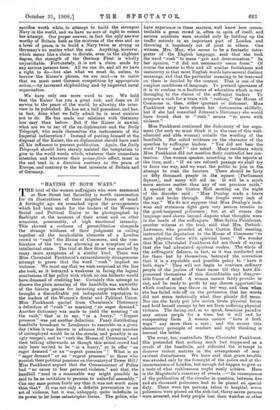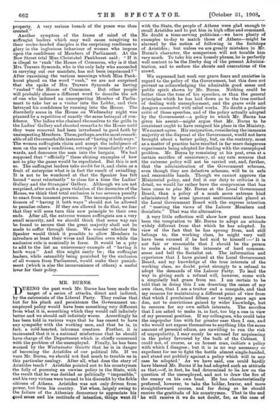"HAVING IT BOTH WAYS." T HE trial of the women suffragists
who were sentenced at Bow Street last Saturday is worth examination for its illustrations of their singular frame of mind. A fortnight ago we remarked upon the arrangements which had been made for the leaders of the Women's Social and Political Union to be photographed, by flashlight at the moment of their arrest and on other occasions, presumably, of high emotional intensity. This showed a coolness of premeditation alongside the strange wildness of their judgment in calling together all the incalculable elements of a London crowd to " rush " the House of Commons, and the com- bination of the two was alarming as a symptom of an intellectual state. The trial at Bow Street was marked by many more symptoms of a similar kind. There was Miss Christabel Pankhurst's extraordinarily disingenuous attempt to prove that the word " rush " implied no violence. We must say that we were surprised at the line she took, as it betrayed a weaknelis in facing the logical conclusions of her policy with which no one hitherto would have dreamed of crediting her. Certainly this attempt to disown the plain meaning of the handbills was unworthy of the bizarre genius for inventing surprises which has brought a discreditable yet indisputable reputation to the leaders of the Women's Social and Political Union. Miss Pankhurst quoted from Chambers's Dictionary a definition of " rush " as meaning "an eager demand." Another dictionary was made to yield the meaning "on the rush," that is to say, "in a hurry." "Urgent pressure" was yet another definition. Fancy distributing handbills broadcast to Londoners to assemble on a given day (when it was known in advance that a great number of unemployed would be in the streets, and possibly in an ugly temper), and to "rush the House of Commons," and then talking afterwards as though this mixed crowd had only been invited to be "in a hurry," or to offer "an eager demand" or an "urgent pressure " ! What is an "eager demand" or an "urgent pressure" to those who nourish their political passions on the oratory of Tower Hill? Miss Pankhurst argued that the Commissioner of Police had "no cause to fear personal violence," and that the handbill "read in a reasonable way might possibly be said to be an invitation to persons to unlawful assembly." Can any sane person fairly say that it was not much more than that? It was not only a definite provocation to an act of violence, but it was, unhappily, quite indefinite in its power to let loose catastrophic forces. The police, who have experience in these matters, well know how uncon- trollable a great crowd is, often in spite of itself, and serious accidents were avoided only by holding up the traffic entirely in an important part of London and throwing it hopelessly out of joint in others. One witness, Mrs. May, who seems to be a fantastic inter- preter of the English language, said that she took the word " rush " to mean "grit and determination." In her opinion, "it did not necessarily mean force." Of course the answer to this and all similar foolishness and insincerity is that most English words have several distinct meanings, and that the particular meaning to be bestowed on them is decided by the context. That is one of the simplest conditions of language. To pretend ignorance of it is to confess to a faultiness of education which is very damaging to the claims of the suffragist leaders. To compare a rush for a train with " rushing " the House of Commons is, then, either ignorant or dishonest. Miss Pankhurst may have chosen her dictionaries skilfully, but if she had consulted Johnson's Dictionary she would have found that to " rush " means "to move with violence."
Miss Pankhurst continued the dishonesty of her argu- ment (for such we must think it in the case of this well- educated and .able woman) outside the wording of the handbills. She called evidence on the character of the speeches by suffragist leaders. "You did not hear the word 'force' used ? " she asked. Many incidents which Miss Pankhurst did not mention flatly contradict her con- tention. One woman speaker, according to the reports at the time, said : "If we are refused passage we shall try to force our way, and we want the public to join in the attempt to rush the barriers. There should be forty or fifty thousand people in the square [Parliament Square], and many will aid us. It will be a much more serious matter than any of our previous raids." A speaker at the Caxton Hall meeting on the night of the disorder said : "Miss Dunlop made a brave fight and broke through. She fought every inch of the way." We do not suppose that Miss Dunlop's inch- wise and strenuous fight gave very serious trouble to the good-tempered policemen ; but at all events the language used shows beyond dispute what thoughts were in the heads of the suffragists. Miss Sylvia Pankhurst, another witness at the trial, said that Mrs. Pethick- Lawrence, who presided at this Caxton Hall meeting, instructed the deputation to the House of Commons "to meet physical force with spiritual force." We wonder that Miss Christabel Pankhurst did not think of saying that she had advocated spiritual rushes. The whole of the suffragists' defence, in fact, as it was conducted not for them but by themselves, betrayed the conviction that it is a reputable and possible policy to "have it both ways." They will not begin to convince ordinary people of the justice of their cause till they have dis- possessed themselves of this discreditable and disagree- able frame of mind. A woman cannot fairly provoke to riot, and be ready to profit by any chance opportunilies which confusion may throw in her way, and then when she has failed ride off on the pretension that her words did not mean technically what they plainly did mean.
Nor can she fairly put into action brute physical forces and hold herself exempt by her sex from suffering physical violence. The daring and, so to speak, feminine paradox may amuse people for a time, but it will end by exasperating them. A woman cannot "have it both ways" any more than a man ; and the sooner this elementary principle of conduct and right thinking is learned the better.
The event, too, contradicts Miss Christabel Pankburst. She pretended that nothing much had happened as a result of the handbills, and ridiculed the at tempt to discover violent motives in the arrangement of non- existent disturbances. We have said that grave trouble was avoided only by the foresight of the police and at ths inconvenience of London, but enough did happen to give us a taste of what recklessness might easily achieve. Here is the Magistrate's summary of events :—" In consequence of the publication of the circular in question, between five and six thousand policemen had to be placed on special duty. There were ten persons taken to hospital, seven policemen were placed on the sick-list, thirty-seven persons were arrested, and forty people lost their watches or other property. A very serious breach of the peace was thus created.
Another symptom of the frame of mind of the suffragist leaders which may well cause misgiving to their cooler-headed disciples is the surprising readiness to glory in the inglorious behaviour of women who impose upon the confidence of Members of Parliament. At the Bow Street trial Miss Christabel Pankhurst said : "If it is illegal to ' rush ' the House of Commons, why is it that Mrs. Travers Symonds, who is the only lady who succeeded in carrying out our mandate, has not been imprisoned ? " After examining the various meanings which Miss Pack- burst placed on the word "rush," we are not surprised that she spoke of Mrs. Travers Symonds as having "rushed " the House of Commons. But other people will probably choose a different word to describe the act of one who induced an unsuspecting Member of Parlia- ment to take her as a visitor into the Lobby, and then betrayed his confidence by running into the House. The disorderly scene in the House on Wednesday night was planned by a repetition of exactly the same betrayal of con- fidence. The ladies who chained themselves to the grille in the Ladies' Gallery and shouted remarks to the House until they were removed had been introduced in good faith by unsuspecting Members. These, perhaps, are the most remark- able of all the remarkable instances of "having it both ways." The women suffragists claim and accept the indulgence of men on the men's conditions, outrage it immediately after- wards, and denounce the men into the bargain. We had supposed that " officially " these shining examples of how not to play the game would be repudiated. But this is not so. The suffragist leaders take credit for it, and claim as a fruit of enterprise what is in fact the result of swindling. It is not to be wondered at that the Speaker has felt bound "most reluctantly" to close for a time the Ladies' Gallery and the Strangers' Gallery. Although we are not surprised, after such a gross violation of the decencies of the House, we think that total exclusion is too severe a penalty to exact from innocent persons. The incomparable practi- tioners of "having it both ways" should not be allowed to penalise others. If they are allowed to do that, we fear that they will soon turn this new principle to their own ends. After all, the extreme women suffragists are a very small minority, and we should think that some way can be found to secure that the great majority shall not be made to suffer through them. We wonder whether the Speaker would think it possible to allow Members to introduce at least their wives and families even while the exclusion rule is nominally in force. It would be a pity to add to the list an unnecessary example of "having it both ways." And this might easily be ; the suffragist leaders, while ostensibly being punished by the exclusion of all women from Parliament, would make their punish- ment (which is also the inconvenience of others) a useful lever for their policy.















































 Previous page
Previous page